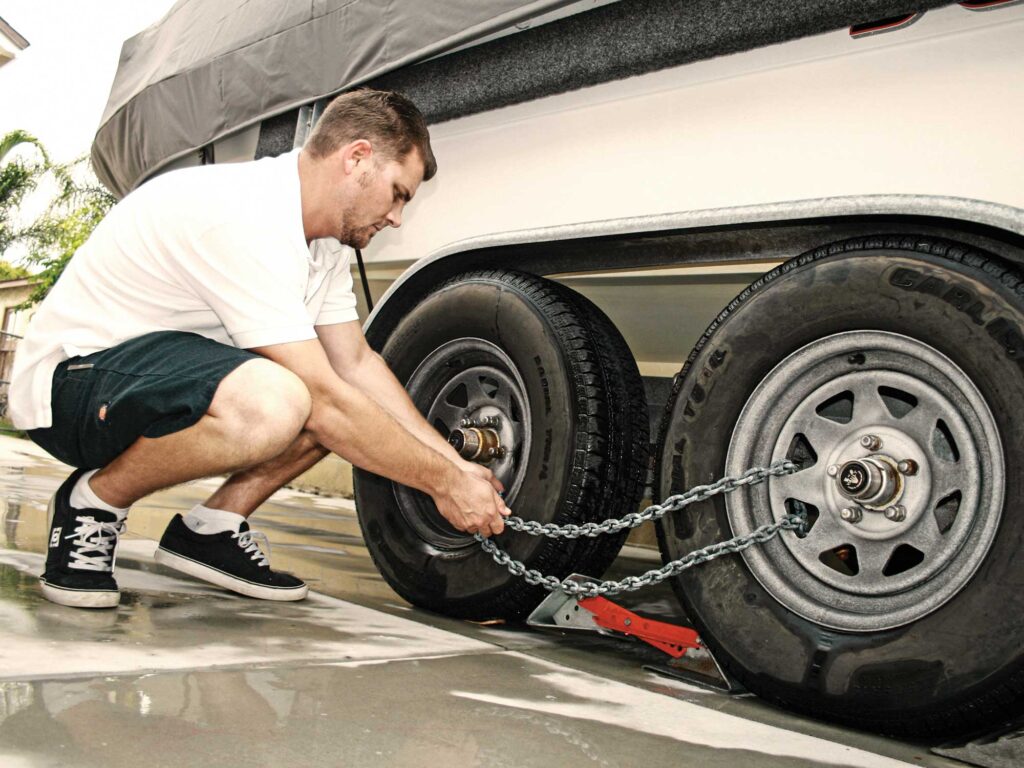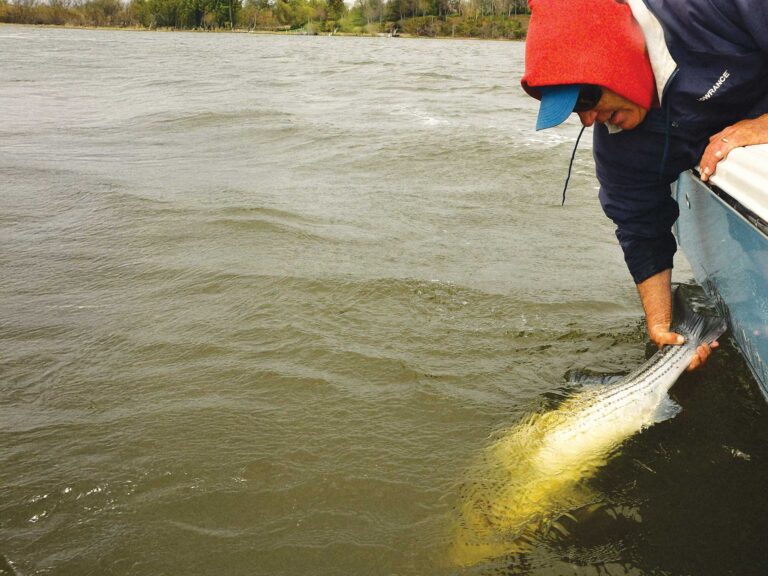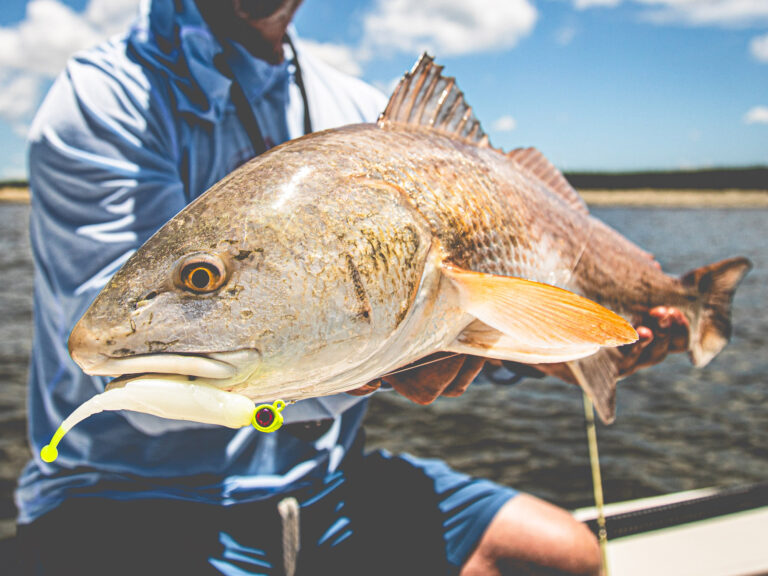
I hate thieves. To me, they are lazy people of low moral character who need to view life through a set of bars.
Fortunately, thieves’ laziness can be used against them. While there is no silver bullet, the best theft prevention strategy is creating a series of low-tech hurdles that make your boat harder to steal than your neighbor’s. Like running from a bear, you don’t have to be faster than the bear, just faster than your hiking mate.
1. Boot It
Boats on trailers are the ones most often stolen, and trailerable boats less than 26 feet make up nearly 75 percent of all thefts. Thieves can hitch a trailer to their truck and be gone in less than 30 seconds. Installing a tire boot is one of the best ways to slow down thieves. Models like the one from Trimax are ideal because of the bright yellow color of the frame, and the large plate covering the lug nuts advertises that your trailer isn’t easy pickings.
2. Chain it Down
Most chains and locks can be cut like butter by standard bolt cutters. You can make their lives more difficult by using chains that are at least 3/8-inch thick, have a metal alloy that’s 70-grade or higher, and are hexagonal or square in shape. Chain the frame to a wheel or something solid like a tree or a stout, welded eye bolt set in a concrete anchor. These premium chains aren’t cheap, though. Pewag makes a square chain that’s 120-grade and costs about $10 to $16 per foot, depending on its thickness. Yet it’s only as good as the lock that secures it.
3. Invest in Quality Locks
The best locks are hardened with special steel alloys and have shackle guards that resist bolt cutters. The Cadillac of padlocks is the ABUS Granit series, but some have a price tag north of $100. Another less expensive quality padlock is the Master Lock ProSeries, which features models with shrouds that guard the shackles. When used with a quality chain, specialty locks add layers to your boat’s protection.
4. Use Coupler Locks
A quality coupler lock keeps thieves from quickly hooking your trailer to their trucks and zooming off. Inferior locks can be rapidly picked, bashed, pried open, or cut with bolt cutters. Ones made by Rhino securely attach to the lip of the receiver and cover the bottom to prevent engagement by a thief’s hitch. The Altor Icon is a beast of a coupler lock that weighs 21 pounds and costs around $350. In a test of its strength, it took one YouTuber about 90 minutes to crack one open with an angle grinder.
5. Receiver Locks
Additional security measures include adding a quality receiver lock, often compatible with ignition or house keys for convenience. The one made by Bolt calibrates itself to the first key inserted into it.
6. Wheel, Engine and Prop Locks
Wheel lug-nut locks from manufacturers like McGard are effective deterrents to tire theft. McGard also makes a similar lock that replaces an outboard’s mounting bolts to prevent thieves from simply unbolting the motor and making their getaway. McGard is also known for its affordable yet effective prop locks.
Read Next: Do I Really Need a Boat Security System?
7. Location, Location
The storage location of a boat is one of the most important security considerations. Look for well-lit storage units near civilization with gated access and security systems. Marinas with liveaboard residents, security guards and video surveillance help keep thieves at bay. However, according to Kerry McCook, who is BoatUS/Geico’s supervisor of new liability, “While many marinas offer lots of security from the land side, many are vulnerable to a dinghy paddled from the water side, so extra precautions are needed when keeping a boat in a slip.” Rack storage is also a good option, especially for boats with a lot of electronics. Boats on lifts make up only 2 percent of all boats stolen.
Thieves tend to target trailer boats in driveways with couplers facing the street, which helps them make a quick getaway. In addition to arming your boat with the full array of locks, park it behind a gate, in a garage, in the backyard, or at least have the coupler facing the house.
8. Electronics Are Especially Vulnerable
The best way to prevent electronics theft is to remove them or conceal their presence under a boat cover. A lockable dash enclosure adds another layer of protection. For flush-mounted displays, use security screws that require a thief to cut them off. Alarms, security lights and dogs are three things that quickly cause thieves to choose another boat to pilfer. Electronic GPS
trackers like the Siren Marine monitoring system can alert owners if a boat moves, as well as other benefits covered below.
9. Insure It
The bottom line is even with all these deterrents in place, a determined, experienced thief can still abscond with your boat. Boat insurance that includes theft protection offers owners peace of mind that even if a boat is stolen, they won’t have to raid their 401(k) or give up boating. According to McCook, always carefully read the insurance certificate of coverage. “Often, there are higher deductibles for theft and endorsements that require you to have things like GPS tracking systems.”
Using a lot of low-tech deterrents is the best way to prevent your boat from becoming a statistic.
10. Keeping Connected
The ability to keep an eye on your boat, no matter where it is, provides an additional layer of safety. Connected systems from brands like Siren Marine, a Yamaha company, are leading the way in remote boat monitoring and security. “The Siren unit comes with GPS, and you can set a geofence so you’ll know if your boat has been moved,” says Andrew Cullen, director of marine connectivity at Yamaha. In addition to notifications on a mobile phone, you can configure Siren to trigger an audible alarm. You can outfit your boat with motion sensors, or sensors that can detect when a hatch is opened or the canvas is unsnapped. —Joe Albanese









